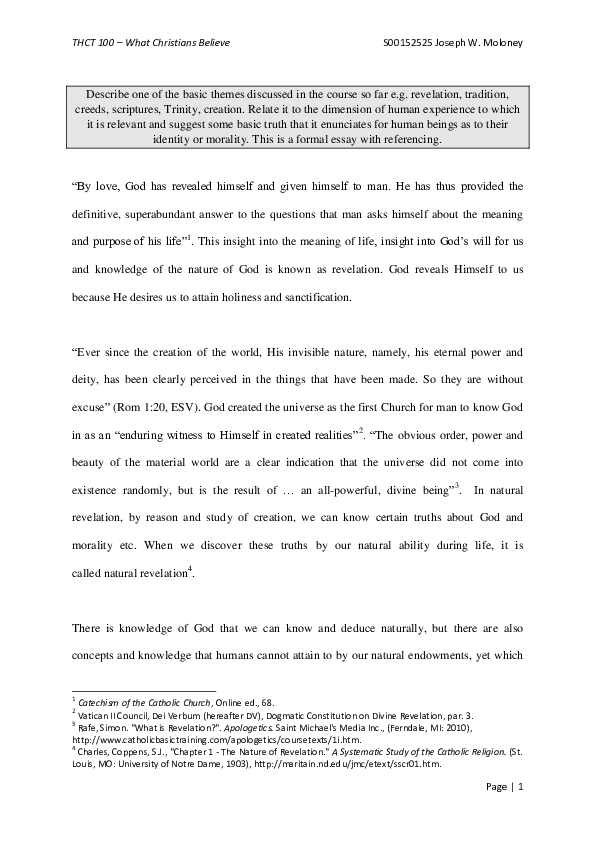Academia.edu no longer supports Internet Explorer.
To browse Academia.edu and the wider internet faster and more securely, please take a few seconds to upgrade your browser.
Moloney J THCT100 Divine Revelation
Moloney J THCT100 Divine Revelation
Related Papers
2012 •
Perichoresis Volume 20. Doctoral Supplement (2022).
God's General Revelation: A Conversation of Dogmatic and Biblical Theology2021 •
The idea of revelation, common to the three great monotheistic religions, is based upon the understanding of a personal God. What humans can know of God is not simply the result of human reason seeking to grasp the divine. It also entails God’s actions of communicating something of himself and his will to human beings. Download full text to read more.https://ir.stthomas.edu/encounteringislam/1026/thumbnail.jp
The Book of Revelation: Questions & Answers
The Book of Revelation: Questions & Answers2022 •
After publishing "Revealing the Father through the Book of Revelation," by Hegumen Abram Sleman, a dear friend posted a very lengthy review containing some questions related to the interpretation of the Book of Revelation, Theological, and Christological questions. Therefore, the Author objectively has drafted these notes, “The Book of Revelation: Questions & Answers,” to clarify and emphasize the truth of God’s word: 1- Part 1: Answering Theological Questions. 2- Part 2: Answering Christological Questions. 3- Part 3: Answering Expository Questions. As St. Paul said, “We know only a portion of the truth, and what we say about God is always incomplete. But when the Complete arrives, our incomplete will be canceled” (1 Cor. 13:9-10, The Message). May the glory be to God, our Father, in the name of our Lord Jesus Christ, by His Holy Spirit. Amen. Fr Abraam Sleman
RELATED PAPERS
ERACLITO raccontato da Livio Rossetti [ 2019 ]
ERACLITO raccontato da Livio Rossetti [ 2019 ]2024 •
Elisabetta Borromeo, Frédéric Hitzel, and Benjamin Lellouch, Déchiffrer le passé d’un empire. Hommage à Nicolas Vatin et aux humanités ottomanes (Leuwen: Peeters, 2022), pp. 3–56
Alexandre (İskender) et Candace (Kaydefa) dans la tradition turque et ottomane, ou la réécriture du roman d’Alexandre2022 •
Covenant University Journal of Politics and International Affairs (CUJPIA)
Russia-Africa Relations in the 21st Century: Symbiotic or Predatory?2021 •
Mağallaẗ baġdād li-l-ʿulūm
EFFECT OF LEAD ACETATE ON HISTOOGICAL FEATURES OF LIVER, SKELETAL MUSCLE AND TESTIS AND SERUM TESTOSTERON LEVEL OF LABORATORY ALBINO MICE Mus musculus2010 •
Journal of rehabilitation medicine clinical communications
A multidisciplinary approach to optimizing long-term functional prognosis of a girl with quadriceps fibrosis2021 •
2022 •
RELATED TOPICS
- Find new research papers in:
- Physics
- Chemistry
- Biology
- Health Sciences
- Ecology
- Earth Sciences
- Cognitive Science
- Mathematics
- Computer Science


 Joseph Moloney
Joseph Moloney